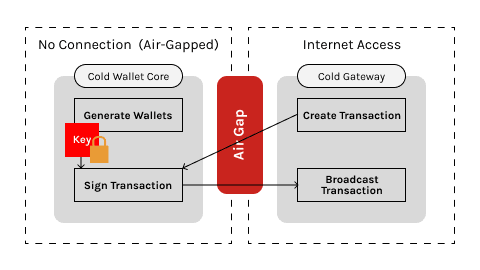In the world of cryptocurrencies, keeping your assets safe is crucial. This is where cold storage comes in, but what it is, exactly?
[key_takeaways]
- Cold storage in crypto refers to keeping digital assets offline, away from internet access, and ensuring heightened security.
- Cold wallets significantly reduce hacking risks by keeping private keys offline, away from online threats like hacking, malware, and phishing scams.
- Hardware wallets, paper wallets, deep cold storage, and sound wallets offer different levels of security and convenience for offline storage.
- Safeguarding the recovery seed phrase is crucial for recovering cold wallets if lost or damaged, emphasizing the need for secure backups.
- While secure, cold storage may not be as convenient for frequent use, requiring additional steps for transactions, compared to hot wallets.
[/key_takeaways]
What is cold storage crypto?
Cold storage, also known as cold wallets or offline wallets, means keeping your cryptocurrency away from the internet.
Cold storage devices keep your private and public keys, which are used to access and manage your crypto, isolated from online risks.
Consider your crypto as a valuable gem. A hot wallet is like displaying it in an unlocked case - easy to admire but at risk of theft. Cold storage is like storing it in a bank vault - very secure but needs extra steps to access.
Cold storage methods vary, but the main idea is to ensure your private keys remain offline and secure.

Different methods of cold storage crypto
There are multiple types of cold wallets. Some are more traditional options like hardware and paper wallets while others are more complex or relatively new like deep cold storage wallets and sound wallets.
Hardware wallet
Hardware wallets resemble USB drives. These physical objects are widely favoured for their user-friendly interface and robust security features.
Any hardware wallet ensures that private keys remain offline, reducing the risk of exposure to online threats like malware or hackers.
To make transactions, users connect the hardware wallet to their computer and authorize transactions through the wallet's software interface.
Paper wallet
Paper wallets are free but less secure, created offline and printed with a private key and QR code. While they allow transactions using the public key, access to funds requires the private key.
However, they're prone to physical loss or damage, and improper storage can lead to QR code misreading.

Metal seed phrase backups
To address the shortcomings of paper wallets, some hardware wallet providers have created stainless steel plates.
In this case, the user engraves seed phrases or private keys onto durable metal tags for backup.
However, metal plates alone aren't enough for cold storage. They're mainly for storing seed phrases or keys securely, but you still need a hardware or software wallet to generate and use the keys.
Deep cold storage wallet
Deep cold storage is the most secure but complex option. It involves storing private keys on mediums completely isolated from networks, like metal engraving on titanium or offline computers.
Retrieving funds from this cold wallet can be challenging, especially if the storage medium is damaged, making it suitable for those prioritizing security over convenience.
Sound wallet
Sound wallets are a fresh idea in cryptocurrency storage. Instead of using hardware or paper wallets like traditional cold storage methods, sound wallets store private keys using sound waves.
These keys are encoded into audio data and can be saved on vinyl records or other sound mediums. To access them, you'd need special software to decode the audio data.
📚Related: Different Types of Crypto Wallets

Security
Cold wallets are very secure because they are offline, making them hard for hackers, malware, and phishing to breach.
They keep private keys offline, lowering the chance of unauthorized entry and giving strong protection against online dangers.
Cold wallets, such as hardware wallets, have excellent security features like dual secure elements and secure chip technology, guaranteeing the safety of cryptocurrency assets.
📚Read more: How to Secure Your Crypto Wallet Effectively
📚Related: Cybersecurity for the Financial Services Industry
Convenience
Cold wallets focus on security but might not be as convenient as hot wallets. Accessing funds from a cold wallet for transactions can take more time and steps than a hot one. This process isn't ideal for quick access to funds.
Cold wallets are less user-friendly for frequent trading but provide reassurance for securely storing valuable assets in the long term.
Recovery
Recovering cryptocurrency from cold storage means accessing the offline device or method where private keys are securely kept, like hardware or paper wallets.
You usually decrypt the private keys if they're encrypted, then transfer them to a safe online wallet or platform to use your funds.
It's vital to have a secure backup of your recovery seed phrase for this process. You can't recover funds if you lose the cold storage device and the seed phrase.
Cost
The cost of cold storage for cryptocurrency varies based on the chosen method. It can range from free to around $150:
- Free: Paper wallets are the most economical choice. You can create them online using free tools, but they need careful storage and have the risk of loss or damage.
- Low cost ($50-$150): Hardware wallets are popular and easy to use. These physical devices look like USB drives and securely store private keys offline. Brands like Ledger, Trezor, and KeepKey fall in this price range.
- No upfront cost (Requires Technical Skill): DIY cold storage involves using an offline computer to create and store private keys. It's free upfront but needs technical know-how and has a higher risk of data loss if not done correctly.
Flexibility
Cold storage wallet for cryptocurrency offers some flexibility, though not as much as hot wallets.
It allows for scalability by adding more hardware wallets and can be carried around to access funds on different computers.
Regardless of temperature changes, the security of private keys remains intact. However, transactions are slower compared to hot wallets.
Also, there's a risk of losing or damaging hardware wallets or paper backups, potentially leading to permanent loss of cryptocurrency if the recovery phrase is misplaced.

How does cold storage work?
Cold storage protects sensitive digital assets, like Bitcoin's public and private keys, by keeping them offline. This adds an extra security layer against theft.
Only during transactions, private keys are moved from a device with an internet connection to one without it.
As the cold wallet system holds over 90% of total deposits and requires high-security measures, the main security goal is to minimize the exposure of the cold-storage device, measured by its connection duration and bandwidth usage.
Therefore, cold storage typically consists of two parts without direct connection:
- The cold wallet core: Responsible for managing private keys and transactions offline
- The cold gateway: Interacts with the internet to create and broadcast transactions.

It's crucial to prevent attackers from accessing users' private keys, even after a breach.
Thus, the cold wallet core remains isolated from any network connection, ensuring that signing transactions from cold wallets needs physical access to a securely isolated device.
Why is cold storage important in crypto?
Cold storage is essential for cryptocurrency because it provides a significant security advantage over hot wallets.
What are the benefits of cold storage crypto?
Here are some benefits of cold storage wallets:
- Reduced hacking risk: Hot wallets, storing private keys online, are vulnerable to hacking. Cold storage keeps private keys offline, eliminating this risk.
- Protecting investments: Cryptocurrency represents a valuable investment. Cold storage adds extra security, ensuring peace of mind.
- Long-term security: For long-term holding, cold storage is wise, protecting against potential vulnerabilities in online exchanges or hot wallets over time.
- Reduced phishing risk: Cold storage prevents falling victim to phishing scams where hackers try to get your private keys online.
- Scalability potential: Hardware wallets, a popular cold storage method, allow adding more devices as your cryptocurrency holdings grow.

Cold vs hot crypto wallets: What’s the difference?
The main difference between hot and cold wallets for cryptocurrency is how they store your private keys and their ability to be audited. Here's a breakdown:
Cold wallets
Storage: Private keys are stored offline on a dedicated cold wallet device (hardware wallet) or a physical piece of paper (paper wallet). Transactions are signed offline on the hardware wallet and then broadcast separately.
Convenience: Cold wallets offer high security but aren't convenient for frequent use. If you trade crypto often or plan to spend it, hardware devices may not be suitable. It's better to keep a larger amount of crypto that you're not using.
Security: It is considered the most secure storage option because private keys are never exposed to the internet, reducing hacking risks.
Audit capability: Cold storage doesn't include built-in audit features because transactions are signed offline. This poses a challenge for both businesses, requiring accurate transaction tracking and transparency, and regular users, seeking control and peace of mind over their finances.
Hot wallets
Storage: Private keys are stored online on a device connected to the internet, like your phone or computer. Transactions are signed directly on the device.
Convenience: Hot wallets are convenient for frequent buying, selling, and trading cryptocurrency, allowing easy access to your funds.
Security: They are less secure than cold storage because private keys are online and vulnerable to hacking attempts if the platform or device is compromised.
Audit capability: Most hot wallets, especially those from reputable exchanges, may have built-in audit trails or transaction history features, but this varies and may not be as transparent as cold storage.
Cold vs hot crypto wallets: Comparison table
| Feature | Cold wallet | Hot wallet |
| Storage | Private keys stored offline (hardware wallet, paper wallet) | Private keys stored online (phone, computer) |
| Convenience | Less convenient for frequent use | Easy access for frequent transactions |
| Security | More secure (offline storage) | Less secure (prone to hacking) |
| Audit capability | Requires manual record-keeping or limited tracking | May have some transaction history (exchange dependent) |
| Best for | Long-term storage, large holdings | Frequent trading, small holdings |
Looking for a crypto wallet for safe daily transactions? Discover swissmoney
Constantly transferring funds between wallets, exchanges, and bank accounts can be a hassle. Therefore, swissmoney steps in to bridge this gap, providing the convenience and hot flexibility you deserve:
- IBAN accounts offer simple, fast, and safe global transactions.
- Multiple wallets let you store, buy, sell, and exchange crypto and fiat.
- Pre-paid cards empower you to spend crypto and fiat without hard limits.
- Extra security is guaranteed through KYC, HTTPS encryption, 2FA, and other safety measures.
Conclusion
In summary, cold storage is like a safe for cryptocurrencies, keeping them offline and away from internet risks. It's very secure but not as convenient for frequent use.
Different types of cold wallets offer varying levels of security. However, it's crucial to keep your recovery phase safe.
While cold storage may not be ideal for everyday transactions, its strong security makes it essential for long-term cryptocurrency storage.
FAQs
Is cold storage good for crypto?
Cold storage is strongly advised for storing cryptocurrency because it offers better security. However, it is less flexible and not as convenient for small daily crypto transactions.
Are cold wallets safe?
Cold wallets, like hardware wallets, are often safer than hot wallets for storing cryptocurrency because they keep your private keys offline, away from the internet. This greatly lowers the risk of hackers stealing your crypto.
However, while cold storage prevents external connections to the device, authorities can still gain access to wallet private keys through direct physical contact with the air-gapped device.
According to specialists, even when admins lack direct access to the keys (as in hardware-based signing mechanisms like HSM), keys can be extracted through various side-channel analysis methods, such as fault-injection attacks or power analysis.
📚Related: Cryptocurrency Security: Essential Guide to Protecting Your Crypto
Where is the safest place to keep crypto?
The safest way to store cryptocurrency is in hardware wallets. This way your private keys are not connected to the internet and are away from online threats like hacking.
However, they are a better choice for long-term storage. If you want to use crypto for day-to-day transactions, consider hot wallets instead.
How do you store crypto cold?
First, acquire a dedicated cold storage device to store cryptocurrency in cold storage.
Then, download the required software to interact with the device. Safeguard the recovery seed phrase associated with your cold wallet to ensure you can recover it if lost or damaged.
Next, generate a new wallet address for each cryptocurrency you plan to store, and finally, transfer your crypto to these addresses on your cold storage wallet to securely store it offline.
Can a cold wallet be hacked?
Cold wallets are harder to hack than hot wallets since they store your private keys offline, away from the internet. But they're not entirely hack-proof.
If someone gets hold of your hardware or paper wallet with your recovery phrase, they could steal your cryptocurrency.
Hackers might also try phishing attacks or malware to get your recovery phrase when you connect your hardware wallet.
There's a slight risk of compromised hardware wallets if bought from a dodgy seller. Therefore, always stick to trusted sources when buying.
What is the best cold storage wallet for cryptocurrency?
The best cold storage wallet depends on your needs and requirements. While there are cold wallet options, here are some of our most favourable choices:
- Ledger Nano X
- Trezor Model T
- Ellipal Titan 2.0
- SafePal S1
- KeepKey
📚Related: How to Choose the Right Crypto Wallet
How to store crypto in cold storage
Here are the steps of how to store cryptocurrency in cold storage:
- Get a hardware wallet like Ledger or Trezor. These physical devices keep your private keys offline, making them very secure.
- Set up your hardware wallet by creating a new one and securely saving the recovery seed phrase. This phrase lets you recover your wallet if needed.
- Send your cryptocurrency to the public address generated by your hardware wallet, storing your funds offline.
- Disconnect the hardware wallet from your computer when not in use to keep your private keys and funds safe from online threats.
- Store the hardware wallet in a secure place, like a safe or safety deposit box, and avoid connecting it to any internet-enabled device.
- When you want to access your funds, connect the hardware wallet to your computer, enter your PIN, and transfer the amount you need. Your private keys stay on the device.
What happens if you lose your cold wallet?
If you lose your cold wallet, what happens depends on how well you've protected your cryptocurrency and the circumstances. Here's what could occur:
- Recovery with seed phrase: If you've kept your recovery seed phrase safe, you can use it to retrieve your wallet and access your cryptocurrency on a new device.
- Loss of access: Without the recovery seed phrase or a backup of your private keys, losing your cold wallet means you may lose access to your cryptocurrency forever. Unlike bank accounts, cryptocurrencies can't be recovered once lost.
- Security risks: Losing your cold wallet could be risky if someone else finds it and accesses your private keys. They could potentially steal your cryptocurrency.
How much does a cold wallet cost?
The cost of a cold wallet can vary, but most hardware cold wallets range from about $50 to $250.
Are there free cold wallets?
Yes, free cold wallets are available, with the most common option being a piece of paper where you can securely store your written private keys offline.

